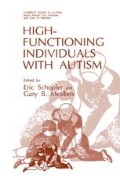Abstract
A continuum of vocational options is needed to meet the wide variety of vocational needs of adults with autism. Just as various educational settings are needed, from the highly structured and specialized to complete mainstreaming, vocational settings follow the same continuum. Sheltered workshops that serve as training and work sites for many developmentally disabled adults represent the most specialized option. Competitive employment in regular jobs in the community is at the other end of the continuum. Given the nature of autism, the most successful options are likely to be ones developed with the autistic individual in mind and where there is some degree of continuous support. The purpose of this chapter is to describe the factors critical to successful employment and two vocational options being developed in North Carolina—supported employment, and the integrated vocational and residential program of the Carolina Living and Learning Center. The vocational models described include the job coach, enclave, mobile crew, and small-business models of supported employment, as well as a model where the vocational program is physically and programmatically integrated with the residential program. Each of these programs will be discussed in terms of the critical elements, and relative strengths and weaknesses, of the model.
Access this chapter
Tax calculation will be finalised at checkout
Purchases are for personal use only
Preview
Unable to display preview. Download preview PDF.
References
Bellamy, C. T., Homer, R., & Inman, D. (1979). Vocational training of severely retarded adults. Baltimore: University Park Press.
Carr, E. G. (1981, July). Analysis and remediation of severe behavior problems. Paper presented at the meeting of the National Society for Children and Adults with Autism, Boston.
Favell, J. E., & Cannon, P. (1976). Evaluation of entertainment materials for severely retarded persons. American Journal of Mental Deficiency, 81, 357–361.
Kay, B. R. (1990). Bittersweet Farms. Journal of Autism and Developmental Disorders, 20, 309–321.
Landrus, R., & Mesibov, G. B. (1986). Preparing autistic students for community living: A functional and sequential approach to training. Unpublished manuscript, University of North Carolina, Division TEACCH, Chapel Hill.
Levy, S. M. (1983).School doesn’t last forever; then what? Some vocational alternatives. In E. Schopler & G. Mesibov (Eds.), Autism in adolescents and adults (133–148). New York: Plenum.
Mank, D. M., Rhodes, L. E., & Bellamy, G. T. (1986).Four supported employment alternatives. In W. E. Kiernan & J. A. Stark (Eds.), Pathways to employment for adults with developmental disabilities (pp. 139–153). Baltimore: Brookes.
McGee, J. (1975). Workstations in industry. Omaha, NE: University of Nebraska.
Mesibov, G. B., Schopler, E., Schaffer, B., & Landrus, R. (1988). Adolescent and adult psychoeducational profile (AAPEP). Austin, TX: Pro-Ed.
Mesibov, G. B., Schopler, E., & Sloan, J. L. (1983).Service development for adolescents and adults in North Carolina’s TEACCH program. In E. Schopler & G. B. Mesibov (Eds.), Autism in adolescents and adults (pp. 411–432). New York: Plenum.
Rhodes, L. E., & Valenta, L. (1985). Industry based supported employment. Journal of the Association for Persons with Severe Handicaps, 10, 12–20.
Schopler, E. (1987). Specific and nonspecific treatment factors in the effectiveness of a treatment system. American Psychologist, 42, 379–383.
Schopler, E., Mesibov, G. B., Shigley, R. H., & Bashford, A. (1984).Helping autistic children through their parents: The TEACCH model. In E. Schopler & G. B. Mesibov (Eds.), The effects of autism on the family (pp. 65–81). New York: Plenum.
Van Bourgondien, M. E., & Elgar, S. (1990). The relationship between existing residential services and the needs of autistic adults. Journal of Autism and Developmental Disorders, 20, 299–308.
Wehman, P., Moon, M. S., Everson, J. M., Wood, W., & Barcus, J. M. (1988). Transition from school to work. Baltimore: Brookes.
Author information
Authors and Affiliations
Editor information
Editors and Affiliations
Rights and permissions
Copyright information
© 1992 Springer Science+Business Media New York
About this chapter
Cite this chapter
Van Bourgondien, M.E., Woods, A.V. (1992). Vocational Possibilities for High-Functioning Adults with Autism. In: Schopler, E., Mesibov, G.B. (eds) High-Functioning Individuals with Autism. Current Issues in Autism. Springer, Boston, MA. https://doi.org/10.1007/978-1-4899-2456-8_12
Download citation
DOI: https://doi.org/10.1007/978-1-4899-2456-8_12
Publisher Name: Springer, Boston, MA
Print ISBN: 978-1-4899-2458-2
Online ISBN: 978-1-4899-2456-8
eBook Packages: Springer Book Archive

